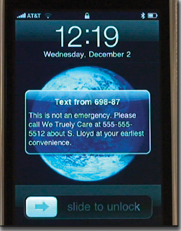Technology Keeps Families Informed
11/1/2010
Communication is a key ingredient in effective family collaboration in long term care, says Neil Moore, founder and chief executive officer of Connect 4 Healthcare. He learned this the hard way when he had difficulty staying in touch with staff at a memory care facility where his father-in-law was living several years ago. Moore launched the company in response to enduring this challenge.

The service, which is offered to family members through skilled nursing and assisted living facilities, is a Web-based program that uses the Internet, e-mail, and text messaging to create and maintain communication between families and providers.
Mary Hanke, life enrichment director at Seabrook Assisted Living in Everett, Wash., an Emeritus Senior Living Community, uses the service to send monthly updates to some 58 family members. “Families have busy lives,” she says, “and this helps us keep in contact with them.”
Hanke, who describes the program as very user-friendly, says that it has been highly successful in her facility.
One feature of the program that Hanke finds most beneficial is that family members who receive an initial message from Seabrook are able to add as many family members as they want to the service. “It’s just so easy to use,” she says.
Families Choose Update Format
Created specifically for residents in skilled nursing, assisted living, and rehabilitation facilities, as well as home and hospice care, the service enables the provider and the family to select the type of wellness updates, such as eating, sleeping, taking medication, and physical therapy, that family members would like to receive on a regular basis.
Amy Yount, assisted living director at the Johnson Center, a Christian Living Community, in Centennial, Colo., touts the service’s ability to maintain communication with families in an efficient manner. “It opens up communication for our nurse assistants and family members,” says Yount, who notes that frontline staff members send updates weekly to family members. Feedback from families about the service has been positive as well, Yount says.
Moore says the family benefits by staying better informed and more connected, while their loved ones benefit because they are better informed and more engaged.